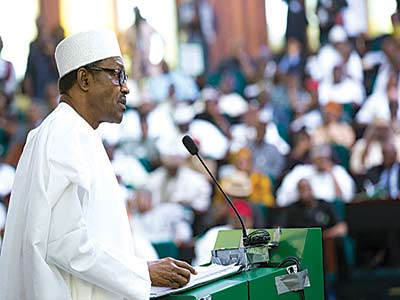
It is justifiable to increase spending to herald ordinate investments in sectors of the economy that will yield long–lasting results that will put many Nigerians to work and stimulate the National Gross Domestic Product. The missing variable in the budgets of years past was the credibility and good faith of the PDP governments. Now, however, the political capital of The Buhari Administration, which is summed in its goodwill and credibility, is expected to translate into ordinate performance, especially of the budget line items.
This is the very first time in recent time that the mix of the recurrent to capital expenditure will be at ratio 70/30; an attestation of the commitment of Buhari’s administration to address huge infrastructure gap and embark on high effective spending in the critical sector that has hindered development over the years. In addition, the new appropriation bill will build an economy that is less vulnerable to oil price shocks creating a resilient diversified income base, and creating an efficient public financial management system.
To increase the appropriation size from N4.49 trillion budgeted in 2015 by Jonathan administration to N6.08 trillion in an economy where the price of its main product has fallen by about 80% can only be audacious. Suffice to say, in the face of dwindling revenue, there must be the commitment to bring to bear the ingenuity to source revenue from alternative sources outside of oil. This in itself is a radical foundational change and fundamental shift towards diversifying our revenue base to fund national spending. The United States, for instance, borrows heavily to fund capital projects and is in the process of a massive infrastructure rebuilding which will cost billions of dollars much of which will be borrowed. The simple economics of this is that it is wise to invest in the future today because the cost will be prohibitive tomorrow! Not only that, the generative force of capital investments is evident in the hands that will be put to work, the foreign investments that will be attracted, and the productivity that will be multiplied.
To deliver on the several development initiatives of Buhari’s administration, the Capital Expenditure saw a gargantuan increase from a sum of N557 billion in the 2015 budget to N1.8 trillion in 2016 budget; about 40% of the total N4.49 trillion total budget in 2015. With effective implementation of the capital allocation, 2016 shall be a year when infrastructure renewal that is essential to inclusive economic growth will commence in Nigeria.
For instance, the judicious utilization of the N433 Billion which represents about 7% of National spending that was allocated to Ministry of Power, Works and Housing, would not only address huge infrastructural decays across the country, but would be a stimulant to spur economic activities in the construction and other related Industry.
In the same vein, the N202 Billion budgeted spending allocated to the Transportation sector is a tool for economic revival through investment in modernized rail system comparable to first-class standard gauge rail available in advanced countries. This will help in easing the all too needed transportation of goods and services across the country, thereby reducing the cost of goods and other inputs that go into manufacturing industry as well as those that are meant for primary consumption; aside the direct and indirect jobs that would be provided to Nigerians during the construction of the projects as well as when the construction is completed.
Social Security
Chief of the estimates in the budget head is the determination of the Federal Government to arrest the incidence of poverty on its verse number of citizens through the implementation of Social Security intervention programs, even in the face of the cash crunch facing the administration as a result of reduction in its revenue, occasioned by significant drop in oil price. The N200 Billion contribution to the special intervention fund is designed to bring Nigerians out of chronic poverty, improve school enrolment by taking out of the street over 10 Million Nigerian children that are of school age. Social cohesion is a sound economic and political strategy!
The proposed 2016 budget aims to train our youths by resuscitating several vocational and technical institutions across the country so as to position them for the coming opportunities of the fourth global industrial revolution. It is a budget that sincerely listens to the yearnings and aspirations of the sick, thereby seeking to rehabilitate and build new primary heath care centers across the nation. The letters and the spirit of the 2016 budget simply epitomize a paradigm shift from the unprofitable ways of the past to provide hope for the future. It is indeed a budget of change which should be supported and encouraged to be implemented to the letter.
To engage the 2016 appropriation bill solely from political and adversarial standpoint is disingenuous, to say the least. Criticism of the appropriation bill, which is an ‘Article of Faith’ should be based on constructive and cerebral engaging debate with a view to assessing the capability of the Budget to deliver on the promise of change and its consistency with the National Strategic Plan of the Government. All pundits and political jobbers owe their country this duty regardless of the side of the swing from which they are billowing.
The task at hand is greater than the political and economic benefits of a privileged, albeit opportunist class. Nigeria was almost comatose before the job of resuscitating her fell in the hands of a good-willed and credible government to whom we all owe much allegiance and support.
• Awodiya, Ph.D is professor of Communication,
State University of New York, Brentwood & NUC Diaspora scholar; visiting professor, Mass Communication Department, University of Lagos,



